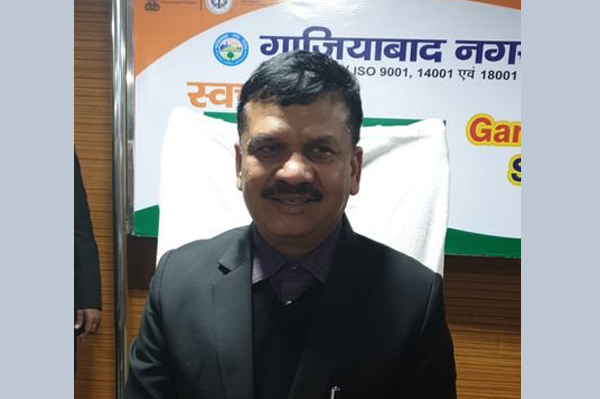
Elets Technomedia organised virtual India Transformation Summit from July 10 to July 12 to address the growth and development of the nation which has been significant in recent years. Dinesh Chandra, Commissioner, Nagar Nigam Ghaziabad, Uttar Pradesh attended the summit and delivered his address on ‘Innovations in ULBs: Future of Urban Governance’.
Mr Chandra commenced hi address by supporting Mr KP Bakshi’s words. He said, “Mr Bakshi mentioned about two types of developments – visible and hidden. Visible is mostly preferred as people can see it and the hidden aspects are not on the priority list. However, in today’s time, we are vulnerable to risks due to the lack of hidden development.”
Adding on he said, the National Green Tribunals (NGT) have set a few guidelines which we have to follow while executing our duties. Also, penalties will be charged on the ULB if found violating the norms.

Briefing on Ghaziabad’s topography, Mr Chandra said, “Situated at the delta of Yamuna and Ganga rivers, Ghaziabad has been blessed with enough availability of water. However, due to water pollution problems have surfaced. And, one of the major reasons for river pollution is plastic waste. To curb the plastic menace, Chief Minister Yogi Adityanath imposed plastic ban in the state and to abide with the ban we in Ghaziabad have implemented it effectively.” There is a dire need for us to shun plastic use and we can only achieve that if we unite in the fight against plastic, just as we are standing against COVID pandemic, he added.

Also Read: Ghaziabad prepared to tackle COVID-19: Dinesh Chandra
Speaking on the solid waste management in Ghaziabad, Mr Chandra said, “Following the establishment of Solid Waste Management Act 2016, Ghaziabad municipal corporation has been proactively working to effectively and methodically manage the solid waste generated in the city.”
In an innovative response to effective solid waste management, “We started door to door segregation of waste. We collected all the recyclable waste such as plastic and utilised it to make as many as seven roads in Ghaziabad”, told Mr Chandra. Further, “We also made the bulk waste generators responsible for the waste they were generating and asked to recycle their waste in their own premises. We also imposed penalties on those not abiding by the producer’s responsibility given under the solid waste management rules”, he added.
Speaking on the improvements in wastewater management, he said, “In Ghaziabad, we implemented the scheme of one city one operator for STPs. So, under that, we have given the contract for wastewater treatment and we are hoping to see better results in the coming times.”
Concluding his address, Mr Chandra said, “There are a few issues we face as we are bordering with Delhi and Haryana where plastic above 50 microns is not banned, whereas, in UP all types of single-use plastic is banned. So, I would like to say that until we stand united against single-use plastic irrespective of its thickness in microns, we will not be able to curb this menace to the extent we visualise.”
Be a part of Elets Collaborative Initiatives. Join Us for Upcoming Events and explore business opportunities. Like us on Facebook , connect with us on LinkedIn and follow us on Twitter, Instagram.











